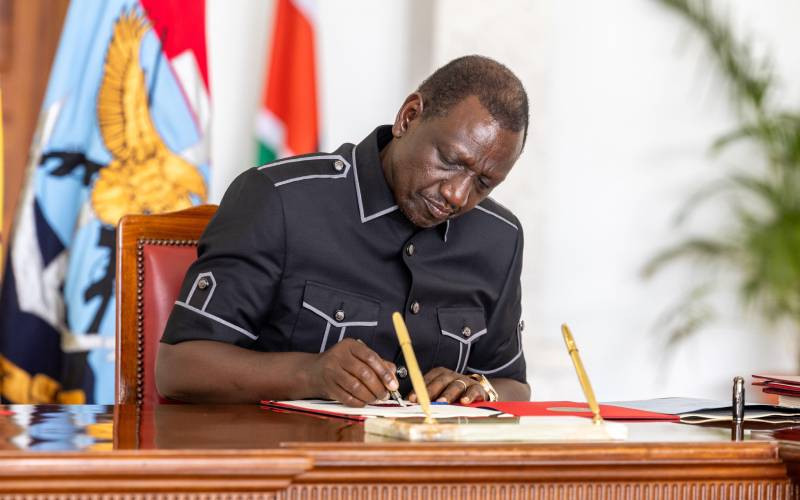By James Anyanzwa
Kenya: The Capital Markets Authority (CMA) has made a dramatic about turn on its plans to licence a second securities exchange in what appears to be a move to fix its troubled relationship with stockbrokers.
The regulator’s change of heart comes after its ambitious proposal to open the market to a competitor drew the wrath of market players. Most argued that the local capital market is still too small to handle a second securities exchange.
The market intermediaries also said they were uncomfortable with the proposal because they had not been consulted.
Last week, CMA Chairman Kung’u Gatabaki told Business Beat that plans for a parallel securities exchange have been put on hold to pave way for the planned demutualisation of the Nairobi Securities Exchange.
The demutualisation is expected to allow the public to buy shares in the NSE.
Describing the market regulator’s negotiations with the NSE and brokers on the issue as “constructive”, Mr Gatabaki indicated that a breakthrough could be in the offing in what has been described as a cold war between CMA and market players.
“The process of licensing a new securities exchange is almost on halt as we finalise the demutualisation .... everything seems to be progressing very well,” Gatabaki said.
CMA’s latest stand comes as reprieve to the operations of the local capital markets whose key projects, such as the setting up of a derivatives and futures market, were in danger of stalling due to the rift between the authority and stockbrokers.
Fair and credible
Gatabaki also said the process of NSE self-listing could be completed this month.
The self-listing and demutualisation processes will convert NSE from a private to a public-listed company, whose shares are listed on the exchange.
“We want a fair and credible securities exchange where opportunities are available to all investors and entry is easy,” said Gatabaki.
Last year, the CMA chair confirmed that the market was at a standstill because of his face-off with stockbrokers who accused him of “over-regulating” the market.
After failing to strike a compromise with the market players, Gatabaki said he would bring another securities exchange on board.
Stay informed. Subscribe to our newsletter
He said that licensing a new securities exchange would neutralise the monopoly currently enjoyed by the NSE, and introduce competition and efficiency in the operations of the local capital markets.
“Following the ongoing issues between NSE and CMA, it has reached a stage where we are not going far. Demutualisation has stalled because of some key outstanding issues. My view is to recommend to the board that it licence a second securities exchange. I would like to introduce another player in this market,” Gatabaki told Business Beat at the time.
War of words
Following his remarks, the performance of the NSE, which is a key barometer of the country’s economic growth, was shrouded in uncertainty, with fears that critical programmes designed to deepen the market would not be actualised on time.
It was feared that the war of words between the regulator and the market players, which spilled into the public domain, would erode budding investor confidence.
The disagreement between brokers and Gatabaki, who was appointed by former President Mwai Kibaki to chair the authority in June 2011, degenerated into a battle for the control of CMA, with brokers demanding a say on who the next chief executive of the authority would be.
However, Treasury is expected to have the final say on who is selected CMA boss after a change in legislation transferred the authority to appoint from the President to the Finance minister.
[email protected]
 The Standard Group Plc is a
multi-media organization with investments in media platforms spanning newspaper
print operations, television, radio broadcasting, digital and online services. The
Standard Group is recognized as a leading multi-media house in Kenya with a key
influence in matters of national and international interest.
The Standard Group Plc is a
multi-media organization with investments in media platforms spanning newspaper
print operations, television, radio broadcasting, digital and online services. The
Standard Group is recognized as a leading multi-media house in Kenya with a key
influence in matters of national and international interest.
 The Standard Group Plc is a
multi-media organization with investments in media platforms spanning newspaper
print operations, television, radio broadcasting, digital and online services. The
Standard Group is recognized as a leading multi-media house in Kenya with a key
influence in matters of national and international interest.
The Standard Group Plc is a
multi-media organization with investments in media platforms spanning newspaper
print operations, television, radio broadcasting, digital and online services. The
Standard Group is recognized as a leading multi-media house in Kenya with a key
influence in matters of national and international interest.






